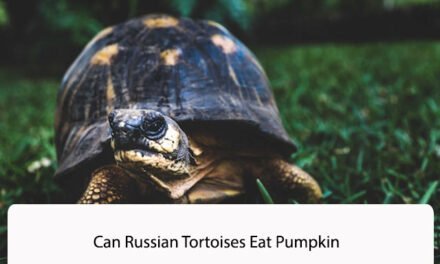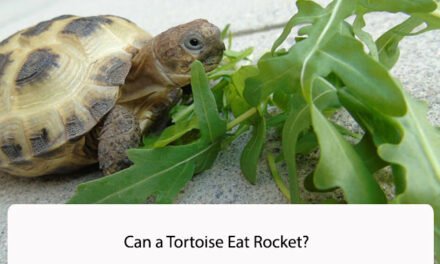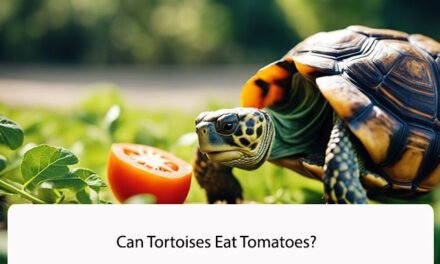Tortoises are fascinating creatures that have been around for millions of years. They are herbivores and eat a variety of vegetables, fruits, and plants. One question that often comes up is whether tortoises can eat cucumbers.
The answer is yes, tortoises can eat cucumbers. In fact, cucumbers are a great source of hydration for tortoises, especially during hot weather. However, it is important to note that cucumbers should not be the only food source for tortoises, as they do not provide all the necessary nutrients for their diet.
It is also important to prepare the cucumber properly before feeding it to your tortoise. Make sure to wash the cucumber thoroughly and remove any pesticides or chemicals. Cut the cucumber into small pieces to make it easier for the tortoise to eat. As with any new food, introduce cucumbers slowly and monitor your tortoise’s reaction to ensure they tolerate it well.
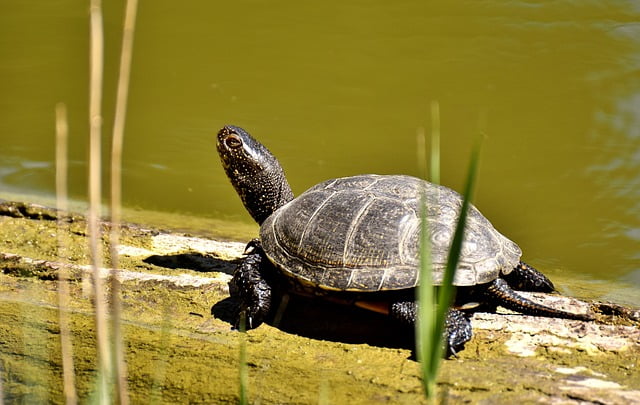
Understanding Tortoises’ Dietary Needs
When it comes to feeding tortoises, it’s important to understand their dietary needs. Tortoises are herbivores, which means they eat plants. However, not all plants are suitable for tortoises. Here are some things to keep in mind when feeding your tortoise:
- Variety is key: Tortoises need a varied diet to get all the nutrients they need. Offer a mix of leafy greens, vegetables, and fruits.
- Avoid high protein and high-fat foods: Tortoises don’t need a lot of protein or fat in their diet. Avoid feeding them foods like meat, dairy, and fatty foods.
- Calcium is important: Tortoises need calcium for healthy bones and shells. Make sure to offer calcium-rich foods like kale, broccoli, and dandelion greens.
- Watch out for toxic plants: Some plants are toxic to tortoises and can make them sick or even be fatal. Do your research before feeding your tortoise any new plants.
When it comes to feeding tortoises cucumbers, they can be a good addition to their diet in moderation. Cucumbers are low in calories and high in water, which can be good for keeping your tortoise hydrated. However, they don’t offer a lot of nutritional value, so they should be offered as a treat rather than a staple food.
Overall, it’s important to offer your tortoise a varied and balanced diet to keep them healthy. By understanding their dietary needs and offering appropriate foods, you can help your tortoise live a long and happy life.
Can Tortoises Eat Cucumber?
Cucumbers are a popular vegetable that many people enjoy eating. If you have a tortoise as a pet, you may be wondering if it is safe for them to eat cucumber. In this section, we will explore whether or not tortoises can eat cucumber.
Tortoises are herbivores, which means they eat plants. They require a diet that is high in fiber and low in protein and fat. Cucumbers are a good source of water and vitamins, but they are low in fiber. This means that while tortoises can eat cucumber, it should not be a significant part of their diet.
If you do decide to feed your tortoise cucumber, it is important to do so in moderation. Too much cucumber can cause digestive problems and diarrhea. It is also important to remove the seeds from the cucumber before feeding it to your tortoise. The seeds can be a choking hazard and may cause intestinal blockages.
In general, it is best to feed your tortoise a variety of vegetables to ensure they are getting all the nutrients they need. Some good options include leafy greens, carrots, and squash. It is also important to provide your tortoise with a calcium supplement to help keep their bones healthy.
In conclusion, tortoises can eat cucumber, but it should only be fed in moderation. It is important to remove the seeds and provide a variety of other vegetables to ensure your tortoise is getting all the nutrients they need.
Benefits of Cucumbers for Tortoises
Cucumbers are a great addition to a tortoise’s diet as they provide various benefits. In this section, we will discuss the benefits of cucumbers for tortoises.
Hydration
One of the most important benefits of cucumbers for tortoises is their high water content. Tortoises need to stay hydrated to maintain their health and well-being. Cucumbers, being 95% water, can help keep tortoises hydrated. This is especially important during hot and dry weather when tortoises are more prone to dehydration.
Vitamins and Minerals
Cucumbers are also a good source of vitamins and minerals that are essential for a tortoise’s health. They contain vitamins A, C, and K, which help support the immune system, promote healthy eyesight, and aid in blood clotting. Cucumbers also contain minerals such as calcium, magnesium, and potassium, which are important for maintaining healthy bones, muscles, and nerve function.
In addition, cucumbers contain antioxidants that can help prevent cell damage and reduce inflammation. This can help keep tortoises healthy and prevent diseases.
Overall, cucumbers are a great addition to a tortoise’s diet. They provide hydration and essential vitamins and minerals that are important for maintaining good health. However, it’s important to feed cucumbers in moderation and as part of a balanced diet to avoid any potential health issues.
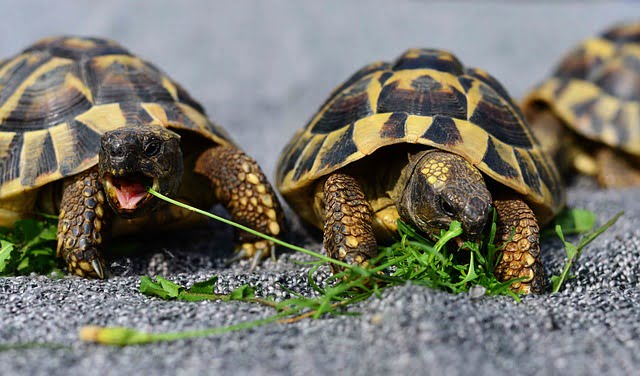
Potential Risks of Feeding Cucumbers to Tortoises
When it comes to feeding tortoises, it is important to be aware of the potential risks of certain foods. While cucumbers may seem like a healthy and harmless snack for your tortoise, there are a few things to keep in mind.
Digestive Issues
One potential risk of feeding cucumbers to tortoises is digestive issues. Cucumbers contain a high amount of water, which can lead to diarrhea in tortoises if they consume too much. Additionally, the skin and seeds of cucumbers can be difficult for tortoises to digest, which can lead to blockages in their digestive system.
Nutritional Imbalance
Another risk of feeding cucumbers to tortoises is a nutritional imbalance. While cucumbers do contain some vitamins and minerals, they are not a complete or balanced diet for tortoises. Feeding your tortoise too many cucumbers can lead to a lack of essential nutrients, which can have negative effects on their overall health.
To avoid these potential risks, it is important to feed your tortoise a varied and balanced diet that includes a mix of vegetables, fruits, and other foods that are appropriate for their species. If you do choose to feed your tortoise cucumbers, be sure to do so in moderation and remove the skin and seeds to make them easier to digest.
How to Safely Feed Cucumbers to Tortoises
Preparation
Before feeding cucumbers to your tortoise, it is important to properly prepare them. First, make sure the cucumber is thoroughly washed to remove any dirt or contaminants. Next, cut the cucumber into small, bite-sized pieces that are easy for your tortoise to eat. It is important to remove the seeds as they can be difficult for your tortoise to digest.
Portion Control
While cucumbers can be a healthy addition to your tortoise’s diet, it is important to practice portion control. Too much cucumber can lead to diarrhea and other digestive issues. As a general rule, cucumbers should make up no more than 10% of your tortoise’s diet. This means that cucumbers should be offered as a treat and not as a staple food item.
It is also important to note that not all tortoises will enjoy cucumbers. If your tortoise does not seem interested in eating cucumbers, do not force them to do so. Instead, try offering other fruits and vegetables to supplement their diet.
In summary, cucumbers can be a healthy addition to your tortoise’s diet when fed in moderation. Proper preparation and portion control are key to ensuring your tortoise stays healthy and happy.
Alternatives to Cucumber in a Tortoise’s Diet
While cucumber can be a great addition to a tortoise’s diet, it should not be the only food they eat. It’s important to offer a variety of foods to ensure that your tortoise gets all the necessary nutrients. Here are some alternatives to cucumber that you can offer your tortoise:
Leafy Greens
Leafy greens are a great source of vitamins and minerals for tortoises. Some good options include:
- Kale
- Collard greens
- Mustard greens
- Turnip greens
- Endive
- Escarole
- Dandelion greens
Make sure to wash the greens thoroughly before offering them to your tortoise.
Vegetables
In addition to cucumber, there are many other vegetables that tortoises can eat. Some good options include:
- Carrots
- Bell peppers
- Squash
- Zucchini
- Sweet potato
- Pumpkin
Make sure to cut the vegetables into small pieces to make them easier for your tortoise to eat.
Fruits
Fruits should be offered in moderation, as they are high in sugar. However, they can be a tasty treat for your tortoise. Some good options include:
- Strawberries
- Blueberries
- Mango
- Papaya
- Kiwi
- Watermelon
Make sure to remove any seeds or pits before offering the fruit to your tortoise.
Overall, it’s important to offer a variety of foods to your tortoise to ensure that they are getting all the necessary nutrients. By offering a mix of leafy greens, vegetables, and fruits, you can help keep your tortoise healthy and happy.

Frequently Asked Questions
What vegetables can tortoises eat?
Tortoises can eat a variety of vegetables, including dark leafy greens like kale and collard greens, as well as carrots, beets, and squash. It’s important to offer a variety of vegetables to ensure that your tortoise is getting a balanced diet.
What fruit can tortoises eat?
Tortoises can eat a variety of fruits, including apples, bananas, and berries. However, fruits should only be offered in moderation as they are high in sugar.
Can tortoises eat peppers?
Tortoises can eat peppers, but it’s important to avoid feeding them spicy peppers like jalapeños or habaneros. Mild peppers like bell peppers are a good option.
Can sulcata tortoises eat cucumber?
Sulcata tortoises can eat cucumber, but it should only be offered as an occasional treat. Cucumber is low in nutritional value and high in water content, so it should not make up a significant portion of their diet.
Can Russian tortoises eat cucumbers?
Russian tortoises can eat cucumber, but it should only be offered as an occasional treat. Cucumber is low in nutritional value and high in water content, so it should not make up a significant portion of their diet.
Can tortoises eat zucchini?
Tortoises can eat zucchini, but it should only be offered in moderation. Zucchini is high in water content and low in nutritional value, so it should not make up a significant portion of their diet.


